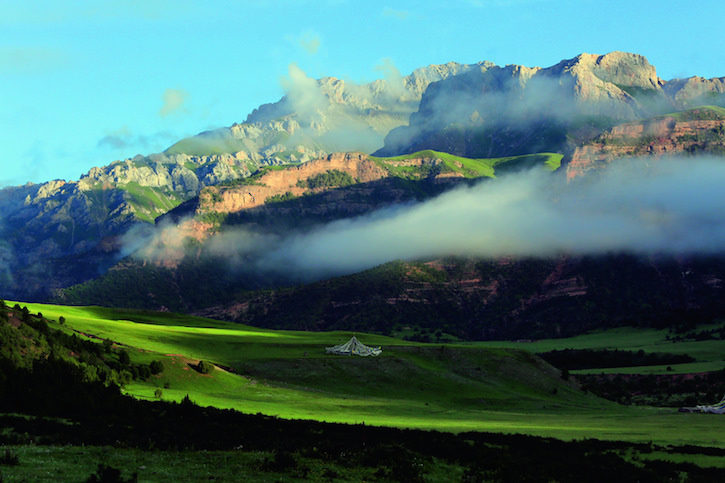
Today we are celebrating the 48th Earth Day. This year’s theme of Environmental and Climate Literacy represents the importance of environmental education as the foundation for progress. In this piece, Paulson Institute conservation expert Li Zhu echoes this theme by sharing his thoughts on the intrinsic value of nature. Li is Associate Director for Conservation Programs at the Institute.
By Li Zhu
The engines are humming away. You are thirty thousand feet in the air on a transcontinental flight. Through the cabin window you see a vast expanse of ice and snow, white and shimmering. Nothing but endless ice blending into the hazy horizon. It must be awfully cold and quiet down there, you think. The landscape is immense, undisturbed and empty. Out of nowhere, you feel a sense of loneliness, and also wonder. Even though you are traveling in the modern tech marvel of a jumbo jet, you feel humbled and defenseless. Thrust into the view of such a wilderness under such an unusual circumstance, you can’t help but marvel at how far humanity has come. And yet, you also regain a sense of awe in face of nature.
Wilderness is disappearing as human society advances. With the beginning of the age of industrialization, wilderness became synonymous with backwardness, useless places that were unutilized, unredeemed through man’s work. Guided by this thinking, man encroached on wilderness with a sense of self-righteousness and conquest. When the tools at man’s disposal were still largely primitive, the impact of such exploitation was modest. But armed with ever more powerful machinery, man can now literally move mountains and reclaim massive lands from the sea.
The impact is now unprecedented and often irreversible. Nearly half of the world’s original forests have disappeared, and as much as 85% of the world’s fisheries are either fully exploited, overexploited, or depleted, according to some estimates.
Early conservationists warned their fellow countrymen against their insatiable invasion into wilderness. In the case of the U.S., this helped spawn the creation of national parks at the turn of the 20th century. Unfortunately, many countries that are playing the catch-up game in economic growth still see wilderness as an untapped resource to be monetized in one way or another. What’s often underappreciated is the fact that wilderness provides crucial ecological goods and services that sustain us all in the long term. In this sense, preying on wilderness for short-term economic gains is at best shortsighted and self-defeating.
But if man has pushed wilderness into such perils, why can’t we use our resolve and ingenuity to protect and restore wilderness?
The case of China provides hope that this just might be possible. Guided by its new ambition of building an “ecological civilization”, meaning incorporating nature into its economic planning, China is trying to redress the mounting environmental woes that result from decades of unbridled economic growth. From the earlier “Grain for Green” program that retired farmland on steep slopes and overgrazed pastures to restore the natural environment, to the initiative to create a well-designed national park system and its stepped-up efforts to protect and rehabilitate its coastal wetlands, China is finally working to tip the balance in nature’s favor.
Of course, this is likely to be a long and testing process. And the Paulson Institute is proud to be working with Chinese partners to help drive this process forward. Whether it’s supporting China to develop its national park system, crafting a blueprint for coastal wetland conservation, or rolling out awareness campaigns promoting migratory bird and wetland conservation that touched millions, we are joining our Chinese partners at the forefront of these conservation endeavors.
To raise awareness of the value of wilderness in China and beyond, we are also working with partners to plan an event series that will bring global attention to wilderness, and galvanize wider actions for wilderness conservation. By shining a spotlight on wilderness, we hope to rekindle people’s interest in discovering and experiencing wilderness, as well as to help enlighten governments’ fundamental approaches to nature and wilderness. Without reining in conventional human-centric mindsets, the last frontiers of nature and wilderness will only recede further.
In this modern world we live in, we are more than ever connected, but at the same time, we’re increasingly divorced from nature and wilderness. This is not only because wilderness has been so much diminished physically, but also because we grow complacent in the cocoons of safety and comfort afforded by modern urban living.
While human ambitions may continue to soar with ever expanding cityscapes and grander engineering feats, the world we inhabit may look increasingly monotonous and mind-numbing. Wouldn’t it be truly a shame if even a fleeting moment of living in awe of nature and wilderness from thirty thousand feet could no longer be a possibility?




